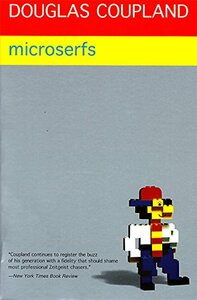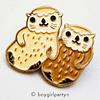You need to sign in or sign up before continuing.
Take a photo of a barcode or cover
This is another all-time favorite. When I first read this book many years ago, it spoke to me like few books (or people) have ever done before or since. It was like a holy text for me for the longest time.
It's a little dated now - as are so many of Coupland's works - but it still has those timeless qualities. The basic premise is that it's the story of a group of people, their ties to each other, to love and to loss as they try to figure out what it's all about.
It's a little dated now - as are so many of Coupland's works - but it still has those timeless qualities. The basic premise is that it's the story of a group of people, their ties to each other, to love and to loss as they try to figure out what it's all about.
Microserfs is a wonderful book from Michael Copeland, from his wunderkind of Can Lit. It explores the lives a group of Microsoft Employees and the endless drugery of their lives. Until the majority of them jump ship and create a start-up and then tbe novel takes a sharp left turn. A wonderful book.
this is one of those books (there are a few here on my goodreads page) that i really loved at the time i read it. unfortunately, that was a long time ago so i really am not sure if it's 5-stars according to susie's ratings circa 2009. but accd'g to susie's ratings circa 1999, it was a winner.
Nice read about self-proclaimed geeks discovering their individual identiy and learning how to have a life.
challenging
emotional
funny
hopeful
informative
inspiring
lighthearted
reflective
medium-paced
Plot or Character Driven:
Character
Strong character development:
Yes
Loveable characters:
Yes
Diverse cast of characters:
Yes
Flaws of characters a main focus:
Complicated
It's amazing to think that when this book was first published in 1995 it must have seemed cutting edge, dealing as it does with coding, Microsoft, geek life in Silicon Valley, and the rise of the "information superhighway". Reading it in 2022 felt more like a being enveloped in a warm, nostalgic blanket. But this book isn't really about coding and computers (even though there are pages simply filled with ones and zeroes). This book is about loneliness, falling in love, found family, and grief. The characters are warm and likable - so much so that two characters who are introduced later on, Dusty and Amy, were actually my favourites and I found myself wishing there had been more of them ("Grotacious!"... my new all-time favourite word).
Anyone who loved Halt and Catch Fire would probably love this.
Also, I would pay good money to have my very own Chyx bracelet.
Anyone who loved Halt and Catch Fire would probably love this.
Also, I would pay good money to have my very own Chyx bracelet.
dark
funny
sad
slow-paced
Plot or Character Driven:
Character
Strong character development:
Complicated
Loveable characters:
No
Diverse cast of characters:
No
Flaws of characters a main focus:
No
It took me a long time to get into this. For the first half of it I would have given it 2 stars, if that, because the characters seemed yes, eccentric, but still rather beige and I didn't really care about them much. But eventually as it progressed I grew to really like everybody. I quite enjoyed it by the end. The tangent conversations that they'd break into all of the time remind me of the way I think, and the way certain friends of mine and I always end up talking when we're together. I appreciated the randomness that was random because of genuine curiosity, not a need to be individualistic or ironically hip.
I’m between 3.5 and 4 stars on this one. There were many moments of this book that I loved, but as a whole something didn’t quite click to make this a favourite of all time. I really enjoy the 20 something age group in books and I liked how character focused this was. I wasn’t crazy about the format and a lot of the pop culture references went over my head. Overall would recommend and I enjoyed my time with this.








